by Jason Ceresa
Although Nikita Khrushchev was born in the year 1894 into a poor family, he worked his way up to supreme leadership of one of the two most powerful countries in history. His grandfather was a serf and his father was a farmer who worked in coalmines. Khrushchev worked at tending sheep and cattle almost from the the day he learned to walk. He also worked in a coalmines, a German factory, and a chemical plant. He learned to hate the capitalists pwners at a very young age and believed that they were the causes of all poverty. Khrushchev fought his way through bad schools and developed skills in public speaking. He joined the Bolshevik Party after the Tzar lost power during the first stage of the Russian Revolution in 1917.
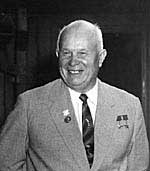
Nikita Khrushchev
As a member of the Red Guard during the second phase, he helped overthrow the short-lived Democratic government in 1917. When the Bolshevik’s seized power under Lenin the Soviet Union was born. During this time Khrushchev was slowly working his way up through the Party ranks, and after Joseph Stalin became Lenin’s sucessor, he was made chief recruiter for the Communist Party. During this period of time a rivalship developed between the United States and the Solviet Union became known as the "Cold War." By the time Stalin died, Khrushchev had only one opponent named Baria standing in his way to power. Baria was removed as an obstical after he was arrested and executed for crimes that he had committed, and Khrushchev had became Premier of Russia.
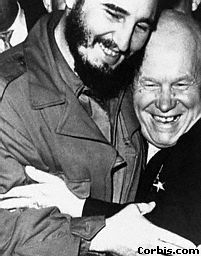
Khrushchev greets Fidel Castro
Khrushchev believed that Communism was going to be the only way to live. This led to what is known as the Cuban Missile Crisis. Premier Khrushchev formed a treaty with Fidel Castro. Castro was the leader of the new Communist nation of Cuba. Castro agreed to let Khrushchev place nuclear missiles in Cuba. This alarmed our leaders here in the United States. President John F. Kennedy felt the offensive missiles being placed in Cuba were a hostile threat to the security of the United States. Khrushchev said that it was only a precautionary measure. The United States sent warships to blockade Cuba and turn back Russian ships bring missiles to Cuba. The world stood at the brink of nuclear disaster as the two super powers faced off.
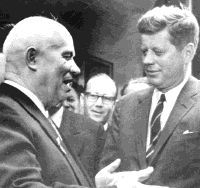
Khrushchev and Kennedy
before the Cuban Missile Crisis
The United States stood fast and warned Russia that if any missile was launched from Cuba it would result in a full attack on Russia. Finally, in October of 1962, Khrushchev ordered the missiles to be removed from Cuba.
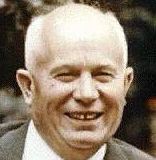
Still smiling
His loss of face during the Cuban Missile Crises and his shortcomings in China increased the power of his opposition. In 1964, Khrushchev was removed from power. The last few years of Khrushchev’s life were uneventful, and he lived quietly in Moscow until his death in 1971.
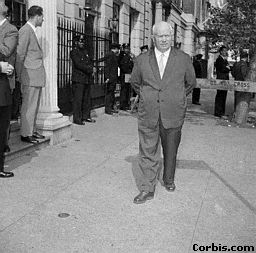
Nikita Khrushchev (1894-1971)
Communist Premier of Russia (1958-1964)
"Nikita Khrushchev" from: http:\\library.thinkquest.org/11046/people/khrushchev.HTML, May 12, 2000
"Nikita Khrushchev (1894-1971)" from: http:\\www.pbs.org/wgbh/amex/bomb/peopleevents/pandeamex83.HTML, May 12, 2000
Smith, Margeret. Men Of Different Worlds. (Handout), May 12, 2000
Picture #1 - "Nikita Khrushchev" from: http:\\library.thinkquest.org/11046/people/khrushchev.HTML
Picture #2 - "Khrushchev greets Fidel Castro" from: http://search.corbis.com/default.asp?i=10002361&vid=i&rid=101
Picture #3 - "Khrushchev meets Kennedy" from: http://detnews.com/specialreports/1999/moon/0720/soviets/soviets.HTML
Picture #4 - "Still smiling" from: http:\\www.pbs.org/wgbh/amex/bomb/peopleevents/pandeamex83.HTML
Picture #5 - "untitled" from: http://search.corbis.com/defaults.asp?i=10357685&vid=i&rid=101